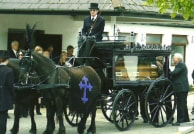|
Stage Two – Anger
Following the stage of denial is the stage of anger. Once people who have experienced an important loss get over the denial phase of grief and accept the situation, they are often confused about where they should focus their energy in order to deal with things. This can lead to confusion and that can turn into anger. These feelings of anger can be focused at anything from the person who has passed away to God, and many times the emotional irritation that people experience can range from true rage to frustration. You should not be surprised when people who are going through the anger stage lash out at the people around them. This can happen because they have nowhere else to focus these feelings, and those who are nearest to them will end up bearing the brunt of these emotions. Sometimes, you may even notice that someone who is going through anger will feel ashamed that they are mad, and this is because the real focus of their anger is on the deceased for leaving them. Since it feels wrong to blame the deceased for what has happened, people will then turn their anger to those who are still alive and who have not suffered this tragedy with them. Family members may even lash out at other family members for things they see as problems, such as not grieving “correctly” or enough. Dealing with Anger When someone is going through the anger stage of grief they will often have thoughts like “Why have you left me like this?” or “This cannot be happening to me, I’m a good person.” This kind of anger is often directed at the world for what is perceived as an unfair outcome. Sometimes it is closely linked in to the stage of denial as people realize that this is in fact happening to them. It feels as if the world has pulled the rug out from under them in some sort of colossal mishap. To many it seems as if something this bad can only happen to bad people, and since it happened to them, it has to be some kind of accident. If you are someone who is going through the anger phase, try and remember that you need to get through the stage without causing harm to relationships with family and friends. It is important that you remember not to focus all of your negative energy at others. They are not responsible for your tragedy, and although you may find yourself getting frustrated with everyone around you and with their actions, you need to remember that they are only trying to help you through this situation. Take a few moments each day to sit by yourself and try to harness your anger so that you don’t have any unnecessary outbursts. Remember to always apologize if you do take your anger out on someone else. Helping Someone with Anger If you are dealing with someone who is experiencing loss and lashing out at people in anger, remember that they are not targeting you specifically. It is never a good idea to react to their anger with anger. Instead, try to diffuse the situation by being as agreeable as possible. Eventually, the person will likely go ahead and realize that they are treating you badly because they are mad at the situation; however, if you get mad and argue with them, you will be participating in the anger, and this could trigger a tense situation that will take longer for them to recover from. One’s patience can be tried when they are around someone who is always angry and distraught with grief. You have to remember to keep in mind that you are dealing with someone who is trying to adjust to a major change in their life. Comments are closed.
|
View by Category
All
Bespoke FuneralsHandling the CostsTestimonials |
|
Celebrant Training Courses
|
Celebrant Services
|
Useful Links
|
Our NOCN Center Number is ICP Celebrants 30003224
©
The International Corporation of Professional Celebrants Limited. All Rights Reserved. Company No. 12693562 | Web Design by Line of Vision







